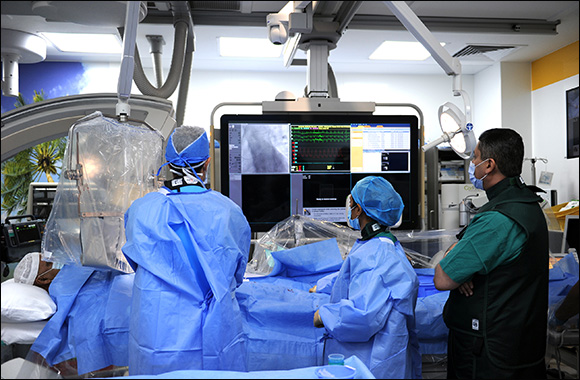The Cardiology Department at Rashid Hospital received 8000 referrals in 2021, said a high level official.
The department is one of the busiest after the trauma and emergency department. It has consistently enhanced its diagnostic and therapeutic services in line with the latest and best international practices and protocols keeping patient-centered care at the heart of their practice.
Dr. Fahad Baslaib, Consultant Cardiologist and CEO of Rashid Hospital, highlighted that DHA pays great emphasis to enhancing patient care and experience across all health facilities and specializations.
He said the cardiology department at Rashid Hospital provides integrated and world-class specialized services and has adopted the latest technologies and smart solutions.
Moreover, protocols are in place to ensure minimum door to needle and door to balloon time because in cases of heart attacks time is of vital importance not only to save lives but also to preserve heart muscle and minimize complications.
The Joint Commission International (JCI) has granted a disease-specific certification in Acute Coronary Syndrome to the cardiology department in the hospital for the best practices followed in dealing with patients suffering from heart attacks and other cardiac disorders.
The accreditation body has also put up some practices followed by the department on their best medical practices website to encourage other hospitals around the world to follow the same standard.
The department received the JCI accreditation in 2012, making it the first department to receive such an accreditation. It has been regularly reaccredited in line with international protocols by JCI reflecting the highest standards of cardiac care.
Treating heart rhythm disorders:
The hospital is a pioneer in treatment of various cardiac disorders including heart rhythm disorders. More than 30 per cent of the cardiology department’s patients have benefited from treatments for heart rhythm disorders.
Dr. Baslaib stressed the importance of the heart arrhythmia treatment and its role in improving the quality life of patients and allowing them to live a more active lifestyle.
The Cardiology Department at Rashid Hospital provides many highly advanced invasive and non-invasive treatments for heart rhythm disorders such as implanting pacemakers of all kinds and cardiac catheterization using the latest devices to diagnose and treat heart rhythm disorders of all kinds.
Dr. Haitham Al Hashemi, Head of Cardiology at Rashid Hospital, referred to the medical evaluation and examinations that arrhythmia patients undergo, such as an ECG, using a heart rate monitor for 24 to 48 hours, in addition to long-term monitors.
He said the causes of cardiac rhythm disturbances include: heart attack, cardiomyopathy as a result of some changes in the structure of the heart muscle, coronary artery disease, high blood pressure, smoking, diabetes, obesity and high cholesterol. Hypothyroidism or over activity of the thyroid gland.
Symptoms of arrhythmia:
Al Hashemi said that the symptoms of cardiac rhythm disturbances may not be noticeable in many cases, but a specialist doctor can detect them during some routine examinations or after doing the electrocardiogram, if needed.
Some of the symptoms of cardiac rhythm disturbances include accelerated heartbeat, high heart rate, pain in the chest, feeling light-headed at times, shortness of breath, fatigue, fainting and loss of consciousness, feeling tired and exhausted, and fatigue when doing some exercises.
Modern techniques
Dr. Marta Ramos, Consultant Cardiologist at Rashid Hospital highlighted that the cardiology centre offers latest techniques such as ablation of tachycardia using radiofrequencies or cooling technology, and ablation without endoscopy.
She said the hospital provides patients with implantable cardiac pacemakers, including wireless and assistive devices for heart failure, with the latest technologies such as physiological regulation technology.
She also highlighted that the hospital has a specialized clinic to monitor the work of defibrillators remotely without the need for the patient to come in person to the clinic, where patients are contacted by phone.
Heart Health Tips:
Dr. Mohamed Al Raqabani, Consultant Cardiologist at Rashid Hospital emphasized on the importance of regular follow-ups as well as adhering to all the doctor’s instructions after a pacemaker is implanted.
Some considerations patients need to bear in mind include: ensuring their exercise routine is not rigorous, especially during the first month after the pacemaker is implanted. Keeping a distance of 15 cms between the mobile phone and pacemaker and not keeping a pacemaker in the shirt.
He provided some tips to prevent heart conditions and stay healthy, they include
1. Quit tobacco
2. Move more: Exercise for 150 minutes at least per week according to your health condition. Additionally, keep yourself active throughout the day and do not lead a sedentary lifestyle.
3. Maintain a healthy weight: Keep an eye on your portion size, eat regular meals full of vegetables and lean protein. Minimize your sugar intake to the bear minimum, watch your salt intake as well. Avoid fast-foods and processed foods.
4. Control risk factors: Get regular physical examinations and yearly check-ups. Keep your blood sugar, blood pressure and cholesterol in check.













